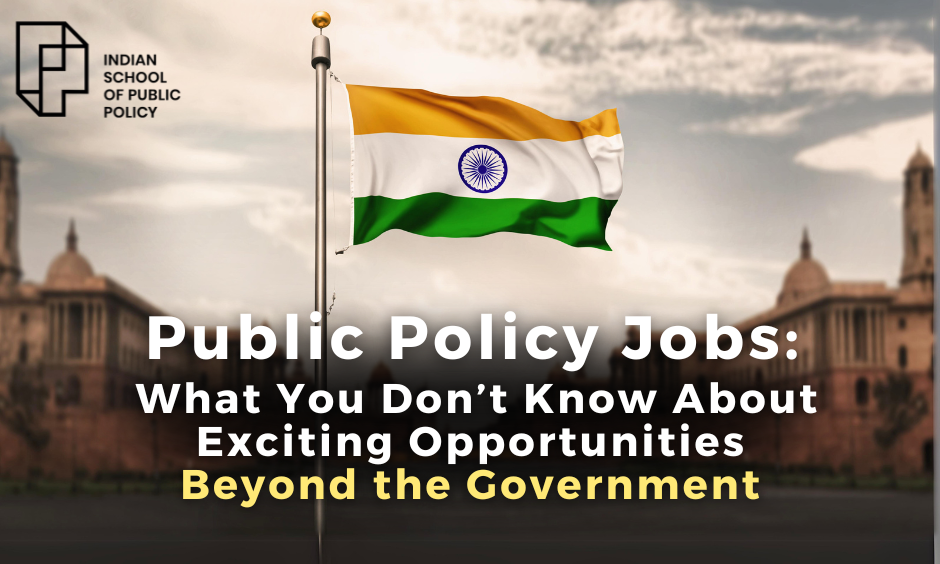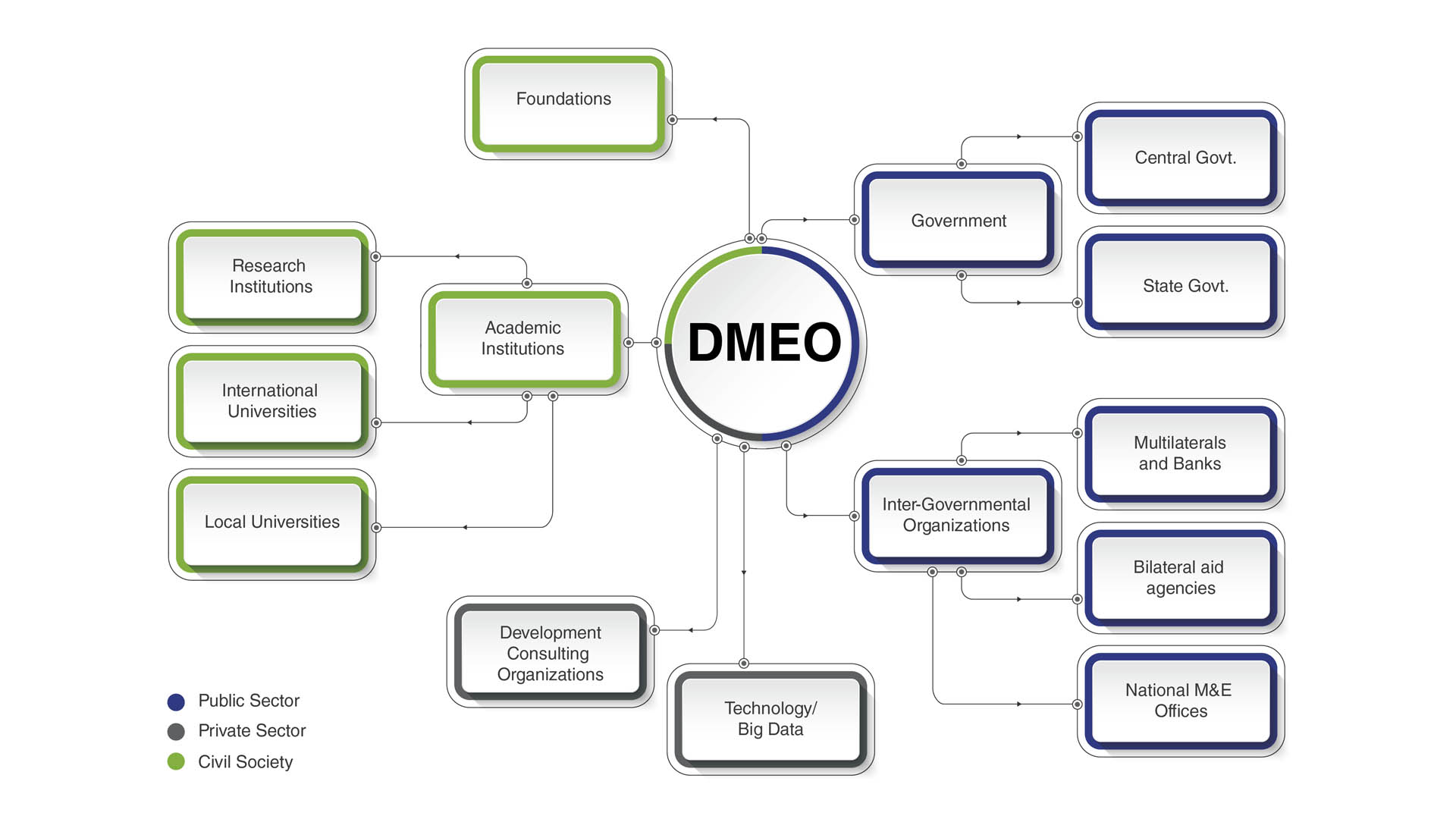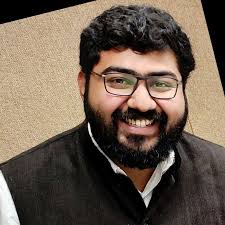
Public Policy Jobs: What You Don’t Know About Exciting Opportunities Beyond the Government

In 2017, when we had the initial conversations about starting a Public Policy institution, it was still difficult to imagine a job in public policy beyond the civil services. Save for a handful of think tanks, even the term “Public Policy” was rarely used outside government institutions. After all, since policy implementation was the government’s prerogative, it made sense that one had to be a government employee to work in Public Policy, right? This perception was further entrenched by the multi-billion dollar coaching industry, sculpting a singular image of what it meant to embrace a public policy role. Consequentially, many of us never even thought it worthwhile to explore alternate pathways to work in the policy space, and most of us never even knew where to start.
As we embarked on the journey to turn the dream of building India’s first exclusive institute of Public Policy education into a reality, the placement cell at ISPP faced a monumental task. As the first placement cell exclusively for public policy jobs in this country, we had no road map or existing models to follow. We had to start right from scratch—doing a landscape assessment of existing policy jobs, advocating for the need for hiring policy professionals, and even convincing organisations that some of the roles that went by different names were, in fact, policy roles!
Fast-forward five years, and four cohorts of ISPP graduates have become policy professionals. Public Policy has become one of the country’s most desired and hottest sectors. So much so that even IIMs and IITs have started Public Policy courses, and many private firms have begun creating dedicated public policy verticals.
But even with all this buzz around public policy and the surge in policy jobs, there is still a lot of ambiguity around the different career pathways available for aspiring public policy professionals. There is no clear list of job types a candidate can pursue nor a clear framework to help young policy professionals shape their careers. Keeping this in mind, I thought it would be helpful to share a broad framework we had developed for ISPP scholars to give them a sense of the policy jobs space. While this list is in no way exhaustive, nor are the differences between the job roles always clear-cut, I share this with the hope that it will give aspiring policy professionals a vantage point to make sense of the public policy job market and understand the different job types that they could pursue.
The eight different job types are:
1. Research:
One of the most visible and sought-after job roles in the Public Policy space, research is an integral part of policy work, and almost all organisations operating in this space have a research vertical. While the nature of research may vary from one organisation to another, these would involve research experiments into new or potential policy schemes, commissioned studies by the government or grant-makers to explore specific policy problems, building evidence for policy advocacy, and understanding the regulatory environment.
To be a policy researcher, one should be equipped with qualitative and quantitative research methods. A well-rounded research CV should also demonstrate knowledge of different research tools (such as certificate courses in R, Python, etc.) and, ideally, a few publications.
2. Implementation:
Policy implementation is one of the newest and rapidly expanding areas within the policy job market. A range of development organisations, consulting firms, and fellowship programmes are involved in implementing priority government schemes, offering job opportunities for aspiring policy professionals.
Initially popularised by the Chief Minister’s Good Governance Associates (CMGGA) Fellowship in Haryana, many states now have their own policy fellowship programmes. In most cases, fellows work directly with District Magistrates and other critical administrative officials on priority policy projects. Consequently, these programmes provide excellent avenues for young professionals to engage with the policy space. Many former fellows have transitioned into consultant roles within different government bodies after their fellowships, effectively becoming integral parts of the government themselves.
In recent years, there has been a significant uptick in the involvement of consulting firms and prominent development organisations in the implementation of various government policies and flagship projects. These firms specifically hire policy professionals for placement directly within ministries. It’s important to note that hiring for these roles often occurs ad-hoc, so keeping a keen eye on LinkedIn or networking with those already working in these spaces is crucial to gaining access to such positions.
Successful application for these roles requires work experience in programme management and thematic expertise.
3. Monitoring and Evaluation:
A wide array of government partners often undertake monitoring and evaluation functions, a vital work domain within the policy space. The best way to depict the various job opportunities that arise in this space is through this image posted on the website of the Department of Monitoring and Evaluation (Government of India) itself:

(Source: https://dmeo.gov.in/partners)
As shown in the image, a range of CSOs and private firms engage in M&E work for the government, and you will be able to find exciting roles with many of these firms. Additionally, while this image is on a Government of India website, most state governments and government institutions also engage with different firms for their own M&E work, opening up additional opportunities.
To enter this space, it’s ideal to specialise in M&E by taking courses or undertaking internships/contract work with relevant organisations. It would also be useful to follow M&E communities like the Evaluation Community of India and EvalYouth.
4. Analysis:
Here, I want to start with a disclaimer that there will always be overlaps between the conventional definitions of policy research, M&E, and policy analysis. That said, I’d like to categorise analysis here as more of an independent approach to analysing existing policy schemes, their impact, and exploring alternatives. In this categorisation, analysis is not undertaken by organisations funded by or allied with the government. Hence, it can critically examine the seen and unseen consequences of different policies. The work includes researching the impact of various schemes, writing op-eds and research papers on different policies, analysing different policies through a socio-political lens, and generating reports on various aspects of government policies.
Many think tanks, academia, civil society organisations, industry associations, and media organisations engage in policy analysis and can be explored for potential job opportunities. A good understanding of research methodologies and communication skills are most desired for such roles.
5. Advocacy:
Regulations affect us all, whether you’re a multi-billion-dollar FMCG conglomerate, a kite-flying enthusiast, or a chai-selling street vendor. Therefore, it is essential that you and the entity or group you represent have a seat at the table when policy decisions concerning your livelihood or interests are being made. Advocacy is the job of doing precisely that. Now, suppose you’re representing the interests of a group of corporate firms. In that case, it’s conventionally called lobbying, and if you’re representing street vendors in ensuring their livelihoods, it may be called advocacy. Both entail ensuring that your group’s concerns are heard and acknowledged by policymakers.
Jobs in policy advocacy can be found with Industry Associations, CSOs, corporations, and public relations firms. At times, terms like ‘Strategic Communications’, ‘Strategic Engagements’, ‘Government Liaisoning’, and ‘Corporate Communications’ are used to denote advocacy jobs. Excellent verbal and written communication skills, a good network with policymakers, and experience in stakeholder engagement are often desired qualities for advocacy roles.
6. CSR / Grantmaking:
While not typically a core area of work for policy professionals, I have often found that having a policy lens is a great attribute for those working in CSR. A lot of development work requires some level of partnership with the government. Additionally, much of the CSR spending is directed towards areas identified as priorities by the government. As such, a policy professional would be well-placed to ensure that the grants translate into impact in priority areas, that relationships with government stakeholders are well-managed, and that the development work complements and augments government schemes and projects.
The best way for young professionals to enter this space would be to join CSR organisations. Grantmaking foundations often require professionals with experience in grantmaking; hence, CSR organisations and CSR aggregators are excellent places to start.
7. Communications:
Some of the government’s most prominent projects (e.g., Swachh Bharat, Beti Bachao, Beti Padhao, etc.) are essentially Social and Behaviour Change Communication (SBCC) campaigns. Additionally, almost all government schemes require strong communication campaigns. After all, what good is a policy or scheme that no one knows about? As such, communications is an integral component within the Public Policy space and an exciting area to work in.
Almost all government partners have communication verticals where you can explore opportunities, and the government also collaborates with various PR firms specialising in Policy Communications, SBCC, etc., for different schemes and projects. A degree in communications or work experience in communications is often useful when applying for such roles. It would also be helpful for aspiring policy communications professionals to gain expertise in tools like Canva, WordPress, Meta Business Suite, etc. and have at least a basic understanding of video editing and graphic design.
8. Politics:
Finally, to no one’s surprise, working in politics is also an exciting career option for aspiring public policy professionals. These days, a career in politics simply does not mean contesting elections. An entire ecosystem of political marketing firms, election management firms, constituency management organisations, and legislative support firms has emerged to support different political parties and politicians. Additionally, almost all political parties have their own data and research wings and hire consultants to work on various aspects of managing a political organisation.
Those inclined to be closer to the hustle and bustle of politics can explore job opportunities with any of these firms that work with political parties or work for the party directly. And, for those daring to be even more immersed in the political arena, you can also choose to contest elections yourself and put all that public policy knowledge you’ve gained to great use!
If you’ve managed to stay on until you read this, thank you for your patience and your sustained interest in becoming a public policy professional! Public policy is an exciting space to find a fast-paced career and create a meaningful impact. I hope this piece has enabled you to understand, however, incrementally, the public policy job market.
For more information about jobs in the space and to stay abreast of the various advances in this sector, I recommend that you attend the Policy Relay and webinars organised by ISPP.
Register your Interest to Study at ISPP

Gopikrishnan Nair
Senior Policy Specialist
Centre for Social and Behaviour Change
A Strategic Communications professional with over nine years of experience working with corporate, social, and educational organizations. Experienced in digital marketing, digital advocacy, skills training, stakeholder engagement, event management, campaign management, fundraising, program management, and human resource management. Personal interests include public policy, technology, digital culture, behavioural science, circular economy and bootstrapping new projects.
https://in.linkedin.com/in/gopikrishnan-nair

